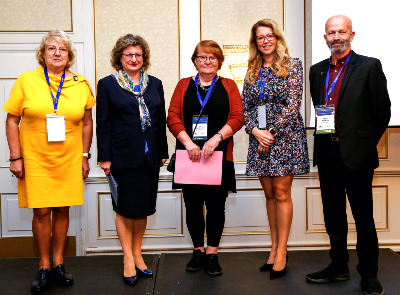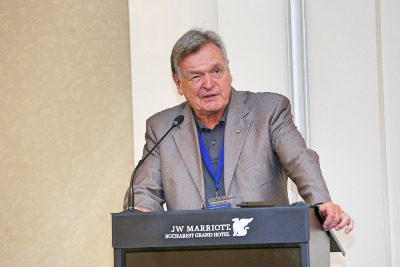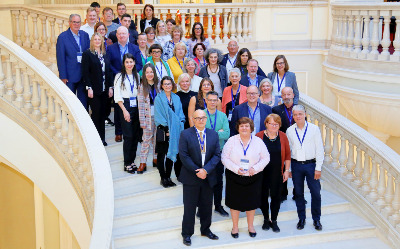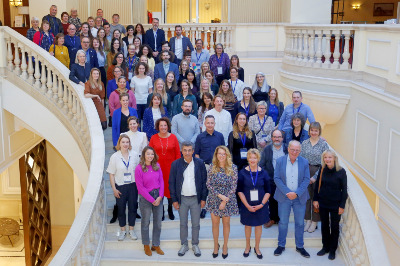|
Bucharest, 18 October 2022 – The 32nd Alzheimer Europe Conference (#32AEC) “Building Bridges” was formally opened yesterday afternoon. The conference is taking place as a hybrid event for the first time ever, with delegates and presenters able to join either on site at the JW Marriot Hotel conference centre in Bucharest or online, thus making the event as accessible, inclusive and interactive as possible. 544 participants from 42 countries are attending the conference, which is taking place from 17 to 19 October 2022. On the agenda are over 250 presenters (187 oral presentations, 38 quick oral presentations and 63 poster presentations), sharing their research, knowledge and experience in an atmosphere of true collaboration and solidarity.
 Iva Holmerová, Chairperson of Alzheimer Europe, opened the conference. She extended a special welcome to the 22 people with dementia among the delegates, as well as their supporters. Echoing the theme of the conference, she said, “we hope to ‘build bridges’ across European borders, to ensure that good practices in dementia care and innovations in diagnosis and treatment are made equally available across the whole European continent.” Iva Holmerová, Chairperson of Alzheimer Europe, opened the conference. She extended a special welcome to the 22 people with dementia among the delegates, as well as their supporters. Echoing the theme of the conference, she said, “we hope to ‘build bridges’ across European borders, to ensure that good practices in dementia care and innovations in diagnosis and treatment are made equally available across the whole European continent.”
As our countries are slowly emerging and recovering from the impact of the COVID-19 pandemic, our continent has unfortunately seen the return of war. However disheartening, she stressed that she was encouraged by neighbouring countries welcoming Ukrainians fleeing the conflict and by organisations doing their best to support refugees with dementia and their carers.
She highlighted the vital work of the European Working Group of People with Dementia (EWGPWD), noting the 10th anniversary of the group this year, singled out the fantastic collaboration that Alzheimer Europe has developed with the INTERDEM network, and expressed the organisation’s gratitude to its corporate conference sponsors, Biogen, Lilly, PAVE and Roche.
In closing, she informed delegates of her decision to step down from the position of Chairperson on Alzheimer Europe. “The organisation has grown a lot in my time here and I am very proud of our achievements, not least of which is our success in truly giving a voice to and integrating people with dementia in all our work”, she stated. She also warmly congratulated her successor, Rosário Zincke dos Reis from Portugal, who was elected at our Annual Meeting today, as her successor. “I am sure that the association will continue to grow and flourish under the new leadership and I wish all of you a very successful and interactive conference”, she concluded, and gave the floor to the next speaker.
Following these opening words, delegates were also welcomed by Diana-Loreta Păun, Presidential Advisor, Romania, who noted that we are currently in the UN Decade of Healthy Ageing, but that dementia is a leading cause of death as well as of disability. She stressed the importance, therefore, of working together, to improve the delivery of care for people with dementia, stating that “this is the opportune time for us to build bridges, to ensure good international collaboration”. She also said that “it is vital that we ensure the medical community is provided with the most up to date information available”, in order to achieve this goal of better care delivery.
Chris Roberts was next up to the lectern, addressing delegates in his capacity as a person living with dementia and as the Chairperson of the EWGPWD. He urged those present not to make assumptions about him and other people with dementia. “Speak to me, ask me, and understand me! I still have a voice and opinions of my own”, he emphasised. “I am still a person even though I am living with dementia”. He also highlighted the importance of working together and of involving people with dementia in all our work, calling to mind the slogan “Nothing about us without ALL of us!” He continued by giving thanks to everyone present, for the assistance, support, services, information, research and understanding afforded to people living with these “cruel and life changing brain diseases”.
Marjolein de Vugtspoke on behalf of INTERDEM (Early detection and timely INTERvention in DEMentia). "Building strong bridges between research and practice is key to sustainable implementation of innovations, and there is much to gain for both researchers and society”, she said. She also stressed that “strengthening intergenerational connections in dementia research and society will help to build a better future for people with dementia".
Cătălina Tudose, Chairperson of Societatea Română Alzheimer welcomed everyone warmly to the conference and to Romania. She also thanked Alzheimer Europe for the guidance and support over the years since her association joined, in 1994. “Many things have changed throughout these years”, she said, but one of the things she wanted to draw particular attention to, in terms of evolution, was that she felt Alzheimer Europe has been able to provide a “unique structure” and an example, due to its involvement of people with dementia in all of its work.
Building bridges - Promoting good dementia care through pan-European collaboration
 The opening ceremony was followed by a keynote presentation delivered by Alexander Kurz (Klinikum rechts der Isar, Technical University of Munich, Germany). He began by pointing out that many national health and social systems in South Eastern Europe are not prepared to meet the challenge of the rapidly rising number of persons living with dementia which is predicted over the coming decades. He also noted their limited ability to provide a good standard of care, due to a lack of public awareness of dementia, outward migration of skilled health workers, insufficient knowledge and cooperation among professional groups, and weakening traditional familial support. The opening ceremony was followed by a keynote presentation delivered by Alexander Kurz (Klinikum rechts der Isar, Technical University of Munich, Germany). He began by pointing out that many national health and social systems in South Eastern Europe are not prepared to meet the challenge of the rapidly rising number of persons living with dementia which is predicted over the coming decades. He also noted their limited ability to provide a good standard of care, due to a lack of public awareness of dementia, outward migration of skilled health workers, insufficient knowledge and cooperation among professional groups, and weakening traditional familial support.
He then said that European collaboration can make significant contributions to improving dementia care in the region, and mentioned several examples of EU-supported collaborative projects. He went into further detail, noting that “transnational collaboration can help to overcome gaps and barriers in dementia by sharing a person-centred model of care, promoting comprehensive and proactive forms of management, developing novel tools and services, taking steps to put dementia higher on political agendas, and advocating for national dementia strategies and plans.”
He pointed out, however, that while there is a wealth of excellent ongoing collaborative projects, these projects do not, in themselves, automatically improve dementia care. Indeed, most do not survive the end of funding, he said, and insisted that “more attention needs to be given to knowledge translation from projects to practice, to dissemination, implementation and sustainability. This requires careful planning, smart delivery and intensive networking.” Bridges need to be built from projects to peers, policy makers and other stakeholders, he concluded.
Poster presentations, parallel sessions and welcome reception
Following the opening ceremony and the keynote lecture, delegates were able to view poster presentations, exhibited in the conference centre and to speak to poster presenters about their research. They also had the chance to join one of five parallel sessions. There was one on technology, one on timely diagnosis and one on arts and culture. A fourth was on the topic of “Smart Bear European Big Data Ecosystem, related innovative technologies for Aging in place - SHAFE - Living Active Strategies”, organised by Ana Aslan International Foundation, while the fifth parallel session was organised by INTERDEM and looked at “Applying an intersectional lens in dementia care research”.
After a short break, a further five parallel sessions were held. One of these looked at dementia-friendly initiatives, while another explored psychosocial interventions and a third delved into carer training and support. The fourth was organised by Societatea Română Alzheimer and was about “Developing educational resources for interprofessional collaboration in the area of dementia”, while the final session was an opportunity for delegates to hear a series of 14 Quick Oral Presentations. To close day one of the conference, a welcome reception was held in the foyer, with musical entertainment provided by Cvartet ANIMA.
Prior to the conference, Alzheimer Europe also hosted an information session and tour of the conference venue for delegates with dementia.
Alzheimer Europe elects a new Board and welcomes new national member organisations during its 2022 Annual Meeting
 Prior to the opening ceremony, a number of ancillary meetings took place at the conference centre in Bucharest. Alzheimer Europe organised its Annual General Meeting (AGM) with representatives of its national member organisations. 33 out of 34 full members were in attendance or were represented. Alzheimer Europe celebrated its achievements in 2021 and shared its plans for 2023 and its 2021-2022 financeswith meeting participants and observers. Prior to the opening ceremony, a number of ancillary meetings took place at the conference centre in Bucharest. Alzheimer Europe organised its Annual General Meeting (AGM) with representatives of its national member organisations. 33 out of 34 full members were in attendance or were represented. Alzheimer Europe celebrated its achievements in 2021 and shared its plans for 2023 and its 2021-2022 financeswith meeting participants and observers.
The AGM also voted on new membership applications. Existing provisional member MTÜ Elu Dementsusega (Estonia) was welcomed as a full member of Alzheimer Europe, while Alzheimer Polska (Poland) and Demenz Selbsthilfe Austria (Austria) were welcomed as new full members.
Alzheimer’s Care Armenia (Armenia), Demencija Lietuvoje (Lithuania), Institute for Alzheimer’s disease and neuroscience (North Macedonia), O Srpskom udruženju za Alchajmerovu bolest (Serbia) and Nezabutni (Ukraine) were voted in as provisional members of Alzheimer Europe. Going forward, Alzheimer Europe will represent 41 members from 37 European countries
At the meeting, the Statutes and Rules and Regulations of Alzheimer Europe were amended to allow the organisation to set up a European Dementia Carers Working Group.
The AGM then voted to elect the 2022-2024 Board:
Office bearers:
- Chairperson: Rosário Zincke dos Reis (Portugal), newly elected to this position
- Vice-Chairperson: Charles Scerri (Malta), re-elected
- Honorary Secretary: Mario Possenti (Italy), newly elected
- Honorary Treasurer: Marco Blom (Netherlands), re-elected
Members:
- Stefanie Becker (Switzerland), re-elected
- René Friederici (Luxembourg), re-elected
- Lorène Gilly (France), newly elected
- Andy Heffernan (Ireland), newly elected
- Martina Mátlová (Czech Republic), newly elected
- Mary-Frances Morris (Scotland, UK), newly elected
- Chris Roberts, re-elected as Chairperson of the European Working Group of People with Dementia (EWGPWD), ex-officio Board member with full voting rights
- Katariina Suomu (Finland), newly elected
- Jochen René Thyrian (Germany), newly elected
Congratulations to all of them and a warm welcome to all new Board members.
Outgoing Chairperson Iva Holmerová, outgoing Honorary Secretary James Pearson and outgoing Board members Sabine Jansen, Pat McLoughlin, Sirpa Pietikäinen, MEP and Karin Westerlund did not stand for re-election. Alzheimer Europe and its Board would like to thank all of them for their service and important contributions and wish them all the very best.
Finally, the AGM unanimously adopted Alzheimer Europe’s 2023 Work Plan and Budget.
INTERDEM network hosts its Annual Meeting in Bucharest
 INTERDEM is a network of researchers interested in psychosocial interventions. It is made up of 221 researchers and academics with different professional disciplines, spread across 21 countries (19 of which are in Europe). The INTERDEM network held its Annual Meeting at the conference centre in Bucharest, on 17 October 2022, just prior to #32AEC, with 99 researchers attending. INTERDEM is a network of researchers interested in psychosocial interventions. It is made up of 221 researchers and academics with different professional disciplines, spread across 21 countries (19 of which are in Europe). The INTERDEM network held its Annual Meeting at the conference centre in Bucharest, on 17 October 2022, just prior to #32AEC, with 99 researchers attending.
The meeting kicked off with a welcome from INTERDEM Chairperson Marjolein de Vugt to all researchers present. The “Interdem Manifesto: Future Perspectives” was also presented. The first session of the meeting, following this introduction, was a business meeting, which gave an introduction to new members and looked back at some highlights from the past year, and at the network’s website, as well as giving an update on projects and an introduction to a new task force initiative. Research collaboration and future calls were also discussed.
In the second part of the meeting, breakout rooms were used for presentations and discussions by the participants, who shared news of their ongoing research activities, and had the opportunity to give and receive feedback, as well as exploring opportunities for further collaboration.
After a break, the meeting continued with the task force sharing an update on its activities and future actions and then the INTERDEM Academy Award was presented, with a shared first place for Hannah Christie and Jeroen Bruinsma and in second place, Cara Sass. The INTERDEM Academy aims to promote the career development and capacity building of dementia care researchers and supports their pathway to senior academic posts in the field. Chairperson Marjolein de Vugt congratulated the winner, before ending the session.
Alzheimer Europe is proud to be a key partner of INTERDEM and was represented at the meeting by Director for Projects Dianne Gove and Project Officer Ana Diaz.
Alzheimer Europe would like to extend a warm welcome to all delegates and remind everyone to use the hashtag #32AEC to join/follow the conversation on Twitter.
For further information, contact:
Jean Georges, Executive Director of Alzheimer Europe, 14, rue Dicks, L-1417 Luxembourg, Tel.: +352-29 79 70, Fax: +352-29 79 72, jean.georges@alzheimer-europe.org
Notes to editors:
Alzheimer Europe is the umbrella organisation of national Alzheimer associations and currently has 41 member organisations in 37 European countries. (www.alzheimer-europe.org).
The European Working Group of People with Dementia (EWGPWD) was launched by Alzheimer Europe in 2012. It is composed entirely of people with dementia, nominated by their national Alzheimer associations. They work to ensure that the activities of Alzheimer Europe reflect the priorities and views of people with dementia. The group operates independently and the Chairperson is also on the Board of Alzheimer Europe. (/www.alzheimer-europe.org/Alzheimer-Europe/Who-we-are/European-Working-Group-of-People-with-Dementia)
INTERDEM is a pan-European network of researchers collaborating in research on and dissemination of Early, Timely and Quality Psychosocial Interventions in Dementia aimed at improving the quality of life of people with dementia and their supporters, across Europe (http://interdem.org/). |